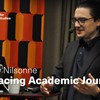nilsonne

Gustav Nilsonne: Pathways to an Open Science System. Replacing Academic Journals
Open science enables cumulative knowledge and facilitates discovery. The transition to an open science system is underway, but important roadblocks remain. A decentralised, evolvable network of platfo
Gustav Nilsonne: Pathways to an open science system: Replacing academic journals
Venue: Institutet för framtidsstudier, Holländargatan 13, 4th floor, Stockholm, and onlineREGISTERResearch seminar with Gustav Nilsonne, Associate Professor of neuroscience. He is active in meta-sciencOpen science enables cumulative knowledge and facilitates discovery. The transition to an open science system is underway, but important roadblocks remain. A decentralised, evolvable network of platforms interconnected by open standards, and governed by the scientific community, is technically feasible. However, academic researchers remain tied to traditional journals not least because assessment of merit is tied to the venue of publication. Ways forward can include redirection of funding from legacy publishing models to new infrastructure and the development of new methods to assess scientific contributions. Concerted action by stakeholders needs to be combined with pluralistic experimentation on policies and interventions to further open science practices.
The dilemma of human enhancement
Would you cut off your legs and replace them with prostheses which can take you places faster? Would you take drugs to enhance your cognitive skills? Perhaps you are already doing that? In the latest
Evidence-based policy - challenges and possibilities
This conference is organized by the Institute for futures studies in cooperation with the Network for evidence-based policy, a Swedish network of academics, journalists and civil servants concerned wi








